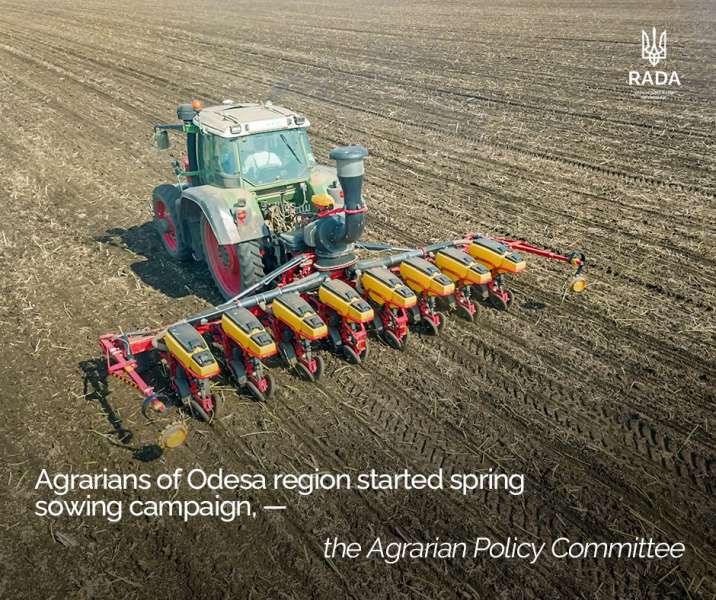Despite all the difficulties, farmers understand their responsibility for the country's food security and will do everything necessary to lay a solid foundation for the 2024 harvest, the Committee on Agrarian and Land Policy reports.
Thus, according to the Department of Agrarian Policy, Food and Land Relations of the Odesa Regional Military Administration, farmers in Odesa region, taking advantage of the warm February weather, have started spring sowing and have already sown 7.5 thousand hectares of spring barley and 4.2 thousand hectares of peas.
It is noted that this year in Odesa region the acreage under peas has significantly increased due to drought problems. The region sowed 68 thou hectares of winter peas for the first time, and it is planned to sow about 40 thou hectares of spring peas.
Overall, in 2024, the region plans to increase the sown area and plant 266 thousand hectares of cereals, 464.5 thousand hectares of industrial crops, 37.9 thousand hectares of vegetables, melons and potatoes, and 21 thousand hectares of fodder.
The need for early grain seeds in the amount of 18.1 thousand tonnes is met by agricultural producers using their own resources. Corn seeds in the amount of 3.0 thousand tonnes were purchased from research farms and dealers of foreign breeding. The same applies to sunflower seeds, which require 2.5 thousand tonnes.
Farmers are currently fertilising winter crops. 365 thousand hectares of crops, or 42.3%, have received nitrogen fertilisation, which will help to improve the development of the vegetative mass of plants and their root system.
The Group needs to purchase 86 thousand tonnes of mineral fertilisers to fertilise the entire area. We have already purchased 55,000 tonnes, which is 64% of the required amount. In addition, 1244 tonnes of pesticides and herbicides are needed to control pests, diseases and weeds on crops. It is noted that 675 tonnes of chemicals have already been purchased, which is 54.2% of the need.
As for the provision of agricultural enterprises with machinery and fuel and lubricants, it is known that 9.7 thousand tractors, 13.2 thousand units of sowing and tillage equipment, including 5.0 thousand seeders and 6.2 thousand cultivators, are planned to be used in spring field work. The company also purchased 21 thousand tonnes of diesel fuel, while the need is 29.5 thousand tonnes, or 71% of the required volume, and 4.2 thousand tonnes of petrol, while the need is 7.8 thousand tonnes, or 54% of the required volume.
It is also noted that late grains are planned to be sown in the region: 150 thou hectares of corn, 8 thou hectares of millet, 8 thou hectares of pulses (chickpeas and lentils), 5 thou hectares of sorghum and 2.5 thou hectares of rice. Among industrial crops, the largest planted areas are 420 thou hectares of sunflower, 25 thou hectares of oil flax, and 6.5 thou hectares of soybeans.
As for the condition of winter crops, in the northern part of the region, 90% of the crops are in good to satisfactory condition and do not cause any particular concern among farmers. However, in the central and southern parts of the region, about 50% of the crops are in good and satisfactory condition, and the other half is characterised as weak and sparse. He adds that if this spring is cool and prolonged, such crops, subject to additional technological operations to care for them, can yield a normal harvest. If the spring is hot and dry, it is possible that some areas will have to be reseeded. In this case, the acreage of spring crops such as sunflower, soybeans, oil flax, corn, millet and sorghum will increase.
